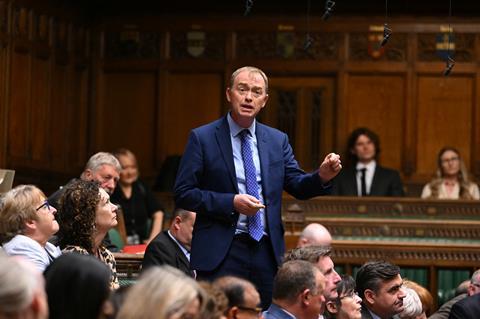For the first time, Tim Farron MP chose not to swear on the Bible when he affirmed his allegiance for the seventh time in parliament this week. He explains why

This week, all MPs of the 2024 Parliament gathered to swear or affirm allegiance to the crown. This is a ritual required by law which must be done before MPs can speak in debates, vote on bills or receive a salary.
Jeremy Corbyn, while waiting in the queue to be sworn in, described the ceremony as “nonsense”. Others who are republicans or nationalists made much of their disdain for swearing allegiance to the English crown. But in reality, all of our promises and commitments are made in the sight of a far loftier authority than the king of England.
Politics needs more people whose yes is yes, and whose no is no
There was a whole range of holy books for MPs to choose to place their hand upon in order to swear allegiance. Bibles of several translations, the Quran, the Bhagavad Gita, the Torah, and probably many others that could be requested in this, the most diverse parliament ever.
I did not swear on a Bible but instead took the option of simply affirming my allegiance. I have been an MP for 19 years now, have been elected six times and have sworn-in seven times (part way through the last parliament, we had the option to swear allegiance to the new king Charles following the death of Queen Elizabeth II). On earlier occasions, I have sworn on a Bible but, having given it some thought in recent years, I concluded that I would not this time.
Do not swear
In Matthew 5:34-37, in the Sermon on the Mount, Jesus says: “But I tell you, do not swear at all: either by heaven, for it is God’s throne; or by the earth, for it is his footstool;…And do not swear by your head, for you cannot make even one hair white or black. Simply, let your ‘Yes’ be ‘Yes’ and your ‘No’ be ‘No’; anything beyond this comes from the evil one.”
My choice to affirm allegiance rather than to swear on the Bible was based on my understanding of the above verse, and also a sense that God calls us to be truthful in every setting.To swear on the Bible may imply that those promises are especially sacred - and that, therefore, other promises are less important. But Christians are called tell the truth and keep our word all of the time. Every word we speak is heard by the living God. There are not some commitments we make before God and others that lie beyond his consciousness or judgement, and for which we are less accountable.
2 Corinthians 5:20 speaks of believers being ambassadors for Christ. This is surely a full-time ambassadorial role and so I do seek – although often fail – to follow and represent Jesus in every setting.
Whether I am in a contentious debate in the Commons, or in the canteen queue for lunch, God - for whom I am an ambassador - knows every true and untrue thing I say. In Matthew 12:36, Jesus warns that, “men will have to give account on the day of judgement for every careless word they have spoken.”
All that said, I don’t criticise those Christians who chose to swear on the Bible; one could argue that they are performing an act of public witness in doing so.
Compassionate truth
Politics especially needs more people whose yes is yes, and whose no is no. Those politicians who have built a brand based on bluntness and straight talking so often do so at the loss of nuance, respect and compassion for the marginalised.
Join with me in praying for a time of compassionate truth in politics – for government ministers and MPs who will tell the truth, even – especially – when it’s not popular. For this parliament, where over 50 per cent of MPs are new, to form a culture of “speaking the truth in love” (Ephesians 4:15).
Pray also for Christian politicians to stand out as people whose words are reliably consistent with their actions, who don’t give in to the temptation to smudge the truth, and who refuse to dehumanise others with their words. Pray that they have the courage to tell the truth of the gospel.





































2 Readers' comments